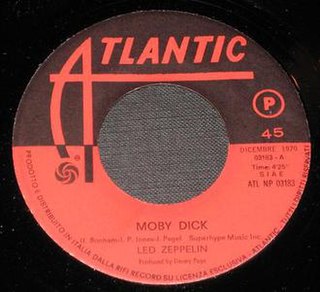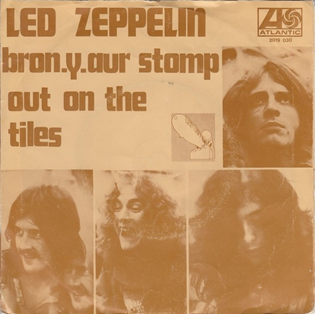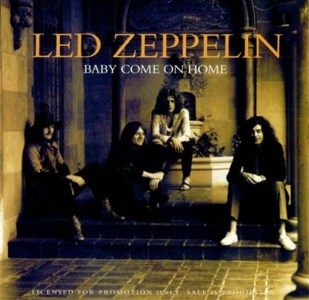
"Black Dog" is a song by the English rock band Led Zeppelin. It is the first track on the band's untitled fourth album (1971), which has become one of the best-selling albums of all time. The song was released as a single and reached the charts in many countries. It is "one of the most instantly recognisable Zeppelin tracks", and was included in Rolling Stone's 500 Greatest Songs of All Time list (US), and ranked No. 1 in Q magazine's (UK) "20 Greatest Guitar Tracks". The lyrics contain typical bluesman themes of lust, eroticism and betrayal.

"Moby Dick" is an instrumental drum solo by English rock band Led Zeppelin, featured on the band's 1969 album Led Zeppelin II. Named after the 1851 novel of the same name by Herman Melville, it was also known by the alternative titles "Pat's Delight" and "Over the Top" during various points of the band's career. The track is often regarded as one of the greatest drum solos of all time.
"Babe I'm Gonna Leave You" is a folk song written by Anne Bredon in the late 1950s. Joan Baez, who learned the song from a student at Oberlin College, recorded the first published version for her 1962 album Joan Baez in Concert and a variety of musicians subsequently adapted it to a variety of styles, including the Association (1965), Quicksilver Messenger Service (1968), and Led Zeppelin (1969). Following the credit on Baez's 1962 release as "traditional, arranged by Baez", subsequent releases did not name Bredon until 1990 when, following Bredon's approach to Led Zeppelin, she received credit and royalties.

"Living Loving Maid (She's Just a Woman)" is a song by English rock band Led Zeppelin from their album Led Zeppelin II, released in 1969. It was also released as a single in Japan and as the B-side of the single "Whole Lotta Love" in the United States.
"Your Time Is Gonna Come" is a song by English rock band Led Zeppelin, released on their 1969 debut album Led Zeppelin. The lyrics concern an unfaithful woman whom the singer claims will pay the price for her deceitful ways.

"Four Sticks" is a song by the English rock band Led Zeppelin from their untitled fourth album. The title reflects drummer John Bonham's performance with two sets of two drumsticks, totaling four.

"Heartbreaker" is a song by the English rock band Led Zeppelin from their 1969 album, Led Zeppelin II. It was credited to all four members of the band, recorded at A&R Recording and Atlantic Studios in New York City during the band's second concert tour of North America, and engineered by Eddie Kramer.
"The Rover" is a song by English rock band Led Zeppelin written by guitarist Jimmy Page and singer Robert Plant. Although mostly recorded years earlier, it was released on the group's 1975 double album, Physical Graffiti.

"The Ocean" is a song by English rock band Led Zeppelin, from their 1973 album Houses of the Holy. The ocean is a metaphor for the "sea of heads" faced by lead singer Robert Plant "in the auditoriums", according to the group's biographer Dave Lewis.
"What Is and What Should Never Be" is a song by English rock band Led Zeppelin. It was written by Jimmy Page and Robert Plant and was included as the second track on Led Zeppelin II (1969).
"Carouselambra" is the fifth song on Led Zeppelin's 1979 album In Through the Out Door. The title refers to the first section of the song that has similarities to carousel music. At more than 10 minutes in length, the song is the second-longest the band recorded in the studio. John Paul Jones' synthesizers dominate the song, with Jimmy Page's guitar playing a supporting role.
"That's the Way" is a folk rock ballad by the English rock band Led Zeppelin from their third album, Led Zeppelin III, released in 1970. As with several of the tracks on the album, it is an acoustic song.
"Sick Again" is a song by English rock band Led Zeppelin from their 1975 album Physical Graffiti. It was written by singer Robert Plant. The song is about a group of teen groupies, which Plant referred to as "L.A. Queens", with whom the band were acquainted on their 1973 US Tour.
"How Many More Times" is the ninth and final track on English rock band Led Zeppelin's 1969 debut album Led Zeppelin. The song is credited in the album liner to Jimmy Page, John Paul Jones, and John Bonham, but Robert Plant was later added to the ASCAP credits.
"Celebration Day" is a song by English rock band Led Zeppelin, and the third track from their 1970 album Led Zeppelin III. The band's last concert film and album, released on 19 November 2012, took their name from this song.

"Bron-Y-Aur Stomp" is a song recorded by English rock band Led Zeppelin for their third album, Led Zeppelin III, released in 1970.

"Candy Store Rock" is a song by English rock band Led Zeppelin, released in 1976 on their album Presence. It was also released as a single in the United States, but it did not chart.

"Killing Floor" is a 1964 song by American blues singer-songwriter and guitarist Howlin' Wolf. Called "one of the defining classics of Chicago electric blues", "Killing Floor" became a blues standard with recordings by various artists. It has been acknowledged by the Blues Foundation Hall of Fame, which noted its popularity among rock as well as blues musicians. English rock group Led Zeppelin adapted the song for their "The Lemon Song", for which Howlin' Wolf is named as a co-author.

"Baby Come On Home" is a soul song by English rock band Led Zeppelin. It was recorded during sessions for the band's debut album but remained unreleased until 1993, when it was included on the compilation Boxed Set 2. The song was also included as a bonus track on some CD editions of the band's ninth studio album Coda as included in The Complete Studio Recordings (1993) and Definitive Collection Mini LP Replica CD Boxset (2008). In 2015, the song was included on disc one of the two companion discs of the reissue of Coda.

"Good Times Bad Times" is a song by the English rock band Led Zeppelin, featured as the opening track on their 1969 debut album Led Zeppelin. The song was Led Zeppelin's first single released in the US, where it reached the Billboard Hot 100 chart.












